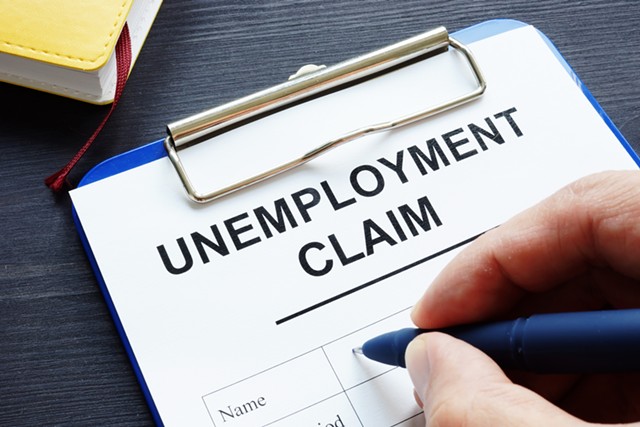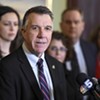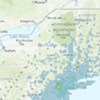Switch to the mobile version of this page.
Vermont's Independent Voice
- News
- Arts+Culture
- Home+Design
- Food
- Cannabis
- Music
- On Screen
- Events
- Jobs
- Obituaries
- Classifieds
- Personals
Browse News
Departments
Browse Arts + Culture
View All
local resources
Browse Food + Drink
View All
Browse Cannabis
View All
-
Culture

'Cannasations' Podcaster Kris Brown Aims to 'Humanize'…
-
True 802

A Burlington Cannabis Shop Plans to Host…
-
Business

Judge Tosses Burlington Cannabiz Owner's Lawsuit
-
Health + Fitness

Vermont's Cannabis Nurse Hotline Answers Health Questions…
-
Business

Waterbury Couple Buy Rare Vermont Cannabis License
Browse Music
View All
Browse On Screen
Browse Events
View All
Quick Links
Browse Classifieds
Browse Personals
-

If you're looking for "I Spys," dating or LTRs, this is your scene.
View Profiles
Special Reports
Pubs+More
Tuesday, March 17, 2020
Labor Coronavirus Layoffs Overwhelm Vermont Unemployment Center
Posted By Colin Flanders on Tue, Mar 17, 2020 at 11:33 PM
Tending bar at the Friendly Toast in Burlington on Monday afternoon, Starr Gaia St James sensed that it might be her last day on the job for a while.
Gov. Phil Scott hadn't yet issued the order to shutter all Vermont bars and restaurants except for takeout, but St James had suspected that the global pandemic might force her employer to close its doors.
So she wasn't surprised when her phone rang later that night, and her manager's name popped up. St James had been laid off, joining a growing number of people who have lost their jobs amid the coronavirus outbreak. Faced with the prospect of a weeks-long shutdown, some Vermont businesses — especially restaurants — have temporarily fired their employees.
The mass layoffs mean St James and other workers are flooding phone lines at Vermont's unemployment call center with the hopes of supplementing their income until they can go back to their old jobs or find new ones.
 But for some people who tried on Tuesday, signing up for unemployment felt like a full-time job.
But for some people who tried on Tuesday, signing up for unemployment felt like a full-time job.
"I’ve been trying all day," 29-year-old St James said later that night, estimating that she had called 15 times throughout the day. "It just plays a recording, and after the recording, it just goes dead."
"None of my friends have been able to get through," she continued. "No one knows what we’re going to do."
To make matters worse, St James' husband lost his job as a cook. Without either of their incomes, they're unsure whether they can make this month's rent, she said.
"It’s so disheartening. If I could just get through, I could get something so I would know things would be fine," St James said. "I can’t even get on the phone with them."
"I just feel helpless," she added.
Signing up for unemployment is a multistep process that requires people to establish a claim with the Vermont Department of Labor's Unemployment Insurance Division. To initiate the process, people must call a claims center and provide details about their last job, including why they left. They must then file claims every week to keep receiving the benefits, which they can do for up to six months.
The current backlog has occurred during the intake process, according to Michael Harrington, acting commissioner of the Department of Labor, who acknowledged the call center's woes during an interview with Seven Days on Tuesday evening. Harrington blamed the problems on a lack of resources — both human and technological — and said the state is working to address the issues.
"What we’re seeing right now is, there’s only so many people taking so many claims, and there’s only so many claim lines open and available," Harrington said.
The reason for those shortcomings, according to Harrington, is that the center is currently equipped to deal with Vermont's typical call volume, which is relatively low in a state where unemployment has been below 3 percent for more than two years.
Fewer claims means fewer people are needed to answer the phones, which is not a problem when the center is receiving its average load of 250 and 300 calls a day. But the center is now seeing roughly 500 calls a day — a number that Harrington conceded is nowhere near the true demand for service because so many people aren't getting through.
Olive Robb, 25, and Peyton Dickie, 29, were among those unable to reach the center Tuesday. They had been calling since they got laid off from their bartending jobs at the Burlington restaurant Honey Road on Monday, dialing the line to no avail.
Frustrated, Dickie walked over to the state's Burlington office before it closed Monday evening. She was handed a pamphlet and told to try the number again when the center opened the next morning.
"Soon as the clock struck 8:30 [a.m.], I gave a call and it was immediately busy," Dickie said. She called 43 more times before she finally got through.
"It's ridiculous," she said of the backlog. "Luckily, I have nothing else to do. I couldn't imagine if someone didn't have the time to do that."
Robb agreed, noting that being unable to sign up for days on end could mean losing out on hundreds of dollars. "That, to me, just seems incredibly unjust," she said. She finally got through on Tuesday after 49 calls.
The state seems to have received the message. Harrington said he's working to move some services online and plans to increase the system's queue capacity so that more calls can get through. And within the next day or two, the state hoped to nearly double the call center's staff from about a dozen employees, he said. There could be as many as 30 people taking calls by week's end, Harrington added.
Robb and others have questioned why the state hadn't recognized the need to make these moves sooner. “You have to have known that this was going to happen," she said.
Harrington responded that the program is 100 percent federally funded, and its budget is typically planned out a year in advance. It wasn't until states of emergency were declared in both the U.S. and Vermont that "doors" for "additional resources" started opening, Harrington said.
"We do our best to plan," he said. "But each situation is unique, and we’re trying to be as flexible as we can."
That same statement could be said for people like St James, who was told that the Friendly Toast won't open until at least April 6, leaving her without a job for the next few weeks — and maybe more.
Luckily, she put off paying a few bills and stashed some tips in case she had to get by for a little while. But she said that will "only last for so long."
St James is applying for a few new jobs, including a janitorial gig, which could help her stay afloat until her bartending job comes back. But for the time being, unemployment seems like her only option, so she plans to wake up Wednesday and start dialing again.
Gov. Phil Scott hadn't yet issued the order to shutter all Vermont bars and restaurants except for takeout, but St James had suspected that the global pandemic might force her employer to close its doors.
So she wasn't surprised when her phone rang later that night, and her manager's name popped up. St James had been laid off, joining a growing number of people who have lost their jobs amid the coronavirus outbreak. Faced with the prospect of a weeks-long shutdown, some Vermont businesses — especially restaurants — have temporarily fired their employees.
The mass layoffs mean St James and other workers are flooding phone lines at Vermont's unemployment call center with the hopes of supplementing their income until they can go back to their old jobs or find new ones.
Related Scott Shutters Bars, Restaurants for at Least Several Weeks

Scott Shutters Bars, Restaurants for at Least Several Weeks
By Colin Flanders and Courtney Lamdin
Off Message
"I’ve been trying all day," 29-year-old St James said later that night, estimating that she had called 15 times throughout the day. "It just plays a recording, and after the recording, it just goes dead."
"None of my friends have been able to get through," she continued. "No one knows what we’re going to do."
To make matters worse, St James' husband lost his job as a cook. Without either of their incomes, they're unsure whether they can make this month's rent, she said.
"It’s so disheartening. If I could just get through, I could get something so I would know things would be fine," St James said. "I can’t even get on the phone with them."
"I just feel helpless," she added.
Signing up for unemployment is a multistep process that requires people to establish a claim with the Vermont Department of Labor's Unemployment Insurance Division. To initiate the process, people must call a claims center and provide details about their last job, including why they left. They must then file claims every week to keep receiving the benefits, which they can do for up to six months.
The current backlog has occurred during the intake process, according to Michael Harrington, acting commissioner of the Department of Labor, who acknowledged the call center's woes during an interview with Seven Days on Tuesday evening. Harrington blamed the problems on a lack of resources — both human and technological — and said the state is working to address the issues.
"What we’re seeing right now is, there’s only so many people taking so many claims, and there’s only so many claim lines open and available," Harrington said.
The reason for those shortcomings, according to Harrington, is that the center is currently equipped to deal with Vermont's typical call volume, which is relatively low in a state where unemployment has been below 3 percent for more than two years.
Fewer claims means fewer people are needed to answer the phones, which is not a problem when the center is receiving its average load of 250 and 300 calls a day. But the center is now seeing roughly 500 calls a day — a number that Harrington conceded is nowhere near the true demand for service because so many people aren't getting through.
Olive Robb, 25, and Peyton Dickie, 29, were among those unable to reach the center Tuesday. They had been calling since they got laid off from their bartending jobs at the Burlington restaurant Honey Road on Monday, dialing the line to no avail.
Frustrated, Dickie walked over to the state's Burlington office before it closed Monday evening. She was handed a pamphlet and told to try the number again when the center opened the next morning.
"Soon as the clock struck 8:30 [a.m.], I gave a call and it was immediately busy," Dickie said. She called 43 more times before she finally got through.
"It's ridiculous," she said of the backlog. "Luckily, I have nothing else to do. I couldn't imagine if someone didn't have the time to do that."
Robb agreed, noting that being unable to sign up for days on end could mean losing out on hundreds of dollars. "That, to me, just seems incredibly unjust," she said. She finally got through on Tuesday after 49 calls.
The state seems to have received the message. Harrington said he's working to move some services online and plans to increase the system's queue capacity so that more calls can get through. And within the next day or two, the state hoped to nearly double the call center's staff from about a dozen employees, he said. There could be as many as 30 people taking calls by week's end, Harrington added.
Robb and others have questioned why the state hadn't recognized the need to make these moves sooner. “You have to have known that this was going to happen," she said.
Harrington responded that the program is 100 percent federally funded, and its budget is typically planned out a year in advance. It wasn't until states of emergency were declared in both the U.S. and Vermont that "doors" for "additional resources" started opening, Harrington said.
"We do our best to plan," he said. "But each situation is unique, and we’re trying to be as flexible as we can."
That same statement could be said for people like St James, who was told that the Friendly Toast won't open until at least April 6, leaving her without a job for the next few weeks — and maybe more.
Luckily, she put off paying a few bills and stashed some tips in case she had to get by for a little while. But she said that will "only last for so long."
St James is applying for a few new jobs, including a janitorial gig, which could help her stay afloat until her bartending job comes back. But for the time being, unemployment seems like her only option, so she plans to wake up Wednesday and start dialing again.
Tags: unemployment, Vermont, coronavirus, jobs, lay-offs, Web Only, Image
Comments
Comments are closed.
Since 2014, Seven Days has allowed readers to comment on all stories posted on our website. While we’ve appreciated the suggestions and insights, the time has come to shut them down — at least temporarily.
While we champion free speech, facts are a matter of life and death during the coronavirus pandemic, and right now Seven Days is prioritizing the production of responsible journalism over moderating online debates between readers.
To criticize, correct or praise our reporting, please send us a letter to the editor. Or send us a tip. We’ll check it out and report the results.
Online comments may return when we have better tech tools for managing them. Thanks for reading.
Related Stories
About The Author

Colin Flanders
Bio:
Colin Flanders is a political reporter at Seven Days, covering the Statehouse. He previously worked as a reporter at a group of Chittenden County weekly newspapers covering Essex, Milton and Colchester.
Colin Flanders is a political reporter at Seven Days, covering the Statehouse. He previously worked as a reporter at a group of Chittenden County weekly newspapers covering Essex, Milton and Colchester.


























































